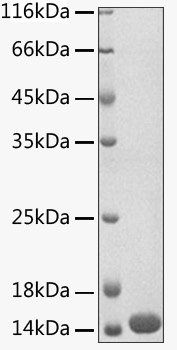Description
Recombinant Human CISD1 Protein
The Recombinant Human CISD1 Protein is a biologically active recombinant protein that plays a significant role in various cellular processes and signaling pathways in human biology. This protein is widely employed in immunological research, cell biology studies, protein-protein interaction analyses, and therapeutic development, providing researchers with a reliable tool for investigating CISD1 function and its implications in health and disease.
This product (SKU: RPCB1862) is produced using E. coli and features a N-His tag for convenient detection and purification. The protein exhibits a calculated molecular weight of 11.3 kDa with an observed molecular weight of 14 kDa under denaturing conditions, achieving ≥ 90 % as determined by SDS-PAGE., ensuring exceptional quality and consistency for research applications.
Key Features
| High Purity by Affinity Chromatography | |
| Mammalian & Bacterial Expression Systems | |
| High lot-to-lot consistency via strict QC |
| Product Name: | Recombinant Human CISD1 Protein |
| SKU: | RPCB1862 |
| Size: | 100 μg |
| Reactivity: | Human |
| Synonyms: | C10orf70, MDS029, mitoNEET, ZCD1 |
| Tag: | N-His |
| Expression Host: | E. coli |
| Calculated MW: | 11.3 kDa |
| Observed MW: | 14 kDa |
| Gene ID: | 55847 |
| Protein Description: | High quality, high purity and low endotoxin recombinant Recombinant Human CISD1 Protein (RPCB1862), tested reactivity in E. coli and has been validated in SDS-PAGE.100% guaranteed. |
| Endotoxin: | Please contact us for more information. |
| Purity: | ≥ 90 % as determined by SDS-PAGE. |
| Formulation: | Lyophilized from a 0.22 μm filtered solution of 20 mM Tris, 150 mM NaCl, 10 % glycerol. |
| Reconstitution: | Centrifuge the vial before opening. Reconstitute to a concentration of 0.1-0.5 mg/mL in sterile distilled water. Avoid vortex or vigorously pipetting the protein. For long term storage, it is recommended to add a carrier protein or stablizer (e.g. 0.1% BSA, 5% HSA, 10% FBS or 5% Trehalose), and aliquot the reconstituted protein solution to minimize free-thaw cycles. |
| Storage: | Store at -20℃.Store the lyophilized protein at -20℃ to -80 ℃ up to 1 year from the date of receipt. After reconstitution, the protein solution is stable at -20℃ for 3 months, at 2-8℃ for up to 1 week. |
Mitochondrial dysfunction is thought to play a significant role in neurodegeneration observed in Parkinson's disease (PD), the loss of mitoNEET (CISD1), an iron-sulfur containing protein that regulates mitochondrial bioenergetics, results in mitochondrial dysfunction and loss of striatal dopamine and tyrosine hydroxylase. CDGSH iron sulfur domain 1 (CISD1, also termed mitoNEET), an iron-containing outer mitochondrial membrane protein, negatively regulates ferroptotic cancer cell death. At the cellular level, CISD1 gene expression increased during human adipocyte differentiation in correlation with adipogenic genes.Thus it is a possible role of CISD1 in obesity-associated dysfunctional adipogenesis in human VAT.


